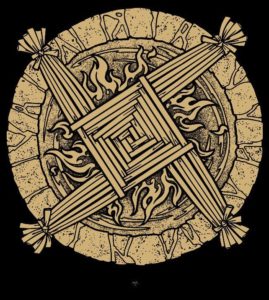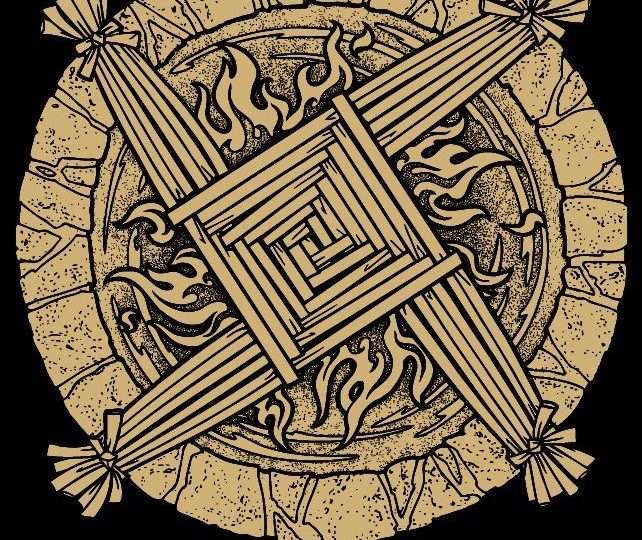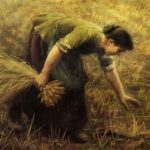In the bleak midwinter, Brigit comes
Reflections
Gradually light is returning to the northern hemisphere. On February 2, we celebrate Brigit, the Celtic goddess of healing, fire, and poetry, and also Candlemas, the Christian holiday which marks the official end to the Christmas season. Down comes the wreath from the door, and up goes the image of the triple goddess—in my house, three tri-colored ears of Indian corn.
The Caileach (kal-ack), Celtic goddess of winter, has stomped out of her Arctic home and taken a sharp turn south this winter, visiting her bone-chilling wrath on the American Midwest. As death tolls rise, Robert Frost’s poem “Fire and Ice” comes to mind, “I think I know enough of hate/ To say that for destruction ice is also great.” In this political climate, there is no shortage of hatred, bruising our souls with a vortex of polarizing views. Yet ever the wheel turns, and Brigit ushers in the light. Her cross is a fire wheel, emblematic of the returning sun. We stoke the fires of hope personally and politically longing for a better day as we watch for the groggy ground hog to wriggle out of its burrow for a midwinter weather check. Sun or shadow, Imbolc is here, and new life quickens in the belly of mother earth.
Winter with its long nights is crone time, perfect for rocking by the fire and remembering. We recall beloved faces with whom we shared so many of our days but whom we’ll never see again. Last week my father would have celebrated his 100th birthday. I took a day to comb through boxes of old photos and put together an annotated photo retrospective of his life—to share with my sister, children, nieces, nephew, grandnieces and grandnephews.
As I sorted and wrote, I noticed individual variations on family themes whether expressed in DNA or turns of fate. Dad called me the maverick in the family, the one for whom home wasn’t good enough. “Sure Dad, unlike you,” I thought, as I catalogued pictures of houses he rented and owned in the multiple cities he and my mother lived in—four before I was born and nine after. My restlessness and desire to stretch my wings is a repeating a pattern. And not only on my dad’s side. My mother was so intent on getting away from her stepmother that no one in her family was invited to her wedding. I exhale as my burden of family guilt lightens. My younger sister racked up merit for being the good daughter. But that wasn’t necessarily an easier path and certainly not my inclination.
Some memories are harder than others. Some losses cut closer to the bone. When most needed, Brigit answers the call of a desolate heart, throws her mantle over grieving shoulders, and whispers hope to an exhausted care giver. It is often at our lowest point that the greatest gift comes. The ego surrenders and allows faith its sway. Long ago when homes were heated with a hearth fire, the coals were carefully banked with ash each night. The first person up in the morning of Brigit’s Day, before coaxing out a flame, would look for the imprint of the goddess’s footstep in the ash to see if she had passed during the night imparting her blessing. A friend to our soul, Brigit comforts us in our despair. When the land is frozen, Brigit brings the thaw.
With passing years, memories accumulate and patterns emerge. In Anam Cara John O’Donohue calls the soul “the priestess of memory, selecting, sifting, and ultimately gathering our vanishing days toward presence” (118). What is the presence of which he speaks? Perhaps our soul moves forward unfettered now by the expectations of our younger years. Crone wisdom calls us to a new way of seeing. We sense our growing acceptance of life as it is and of our own limitations, including our mortality. Perhaps, if we are gentle with our soul and make friends with it, embracing it as our truest companion in hours of solitude, we will appreciate our own unique beauty. A soul cherished and cared for gives back, allowing our mind to grow more open and flexible even as our body stiffens.
Perhaps the ultimate presence is what accompanies us beyond space and time. Brigit’s flame like our soul’s fire is never extinguished. She is our Anam Cara, the companion of our soul, through the vicissitudes of this life and beyond.
May Brigit light your way,
Melody




